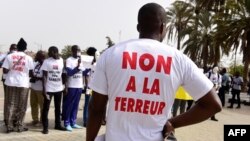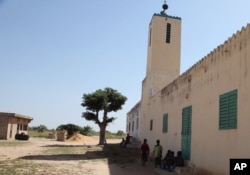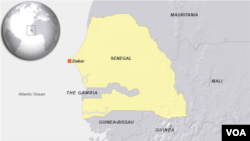In a mass, terror-related trial, a special court in Senegal’s capital, Dakar, has sentenced more than a dozen suspected militants to serve prison sentences ranging from five to 20 years on charges of supporting terrorism and providing material support to militant groups in the country.
The court announced its verdict Thursday against several individuals including Makhtar Diokhane and his lieutenants, who were found guilty of membership in Boko Haram and al-Qaida in the Islamic Maghreb (AQIM).
A total of 14 militants were convicted while another 15 individuals were acquitted of the charges brought against them by the prosecutors for lack of evidence.
Those sentenced could appeal their convictions in the country’s appeals court.
Makhtar Diokhane, the leader of a terror cell, received the harshest sentence of 20 years in prison.
According to court documents, Diokhane was a religious teacher in Senegal and was linked to the Boko Haram terror group, who has been working to establish the group’s footprint in Senegal.
Reactions
Many in Senegal predicted Diokhane’s conviction. However, Alioune Ndao’s sentence caught everyone by surprise.
The court gave him a 30-day probation period for illegally possessing a weapon. Ndao is allegedly a Salafist imam with close ties to those convicted of terror charges in Thursday’s trial. The court could not give him a harsher punishment because of lack of evidence against him.
“People are especially stunned by the verdict given by the court especially for the case of Imam Ndao,” Baye Abdou Cisse, a Dakar-based journalist who covered the trials from the beginning, told VOA.
“For many Senegalese, the mountain gave birth to a mouse,” Cisse added referring to Ndao’s light sentence of only 30 days probation. The public prosecutor had requested a 30-year sentence against Ndao.
Analysts like Jacob Zenn of the Washington-based Jamestown Foundation, who has been researching terror groups in Senegal, believes the trial is a step in the right direction in Senegal and demonstrates the country’s seriousness in cracking down on terror cells operating in the country and undermining its security.
“I think Senegal … sought to send a message to the international community [that] it was responsible in its prosecutions while also putting future jihadists on notice [that] the country will take the issue of terrorism and foreign fighting seriously,” Zenn said referring to Senegalese going overseas to fight for terror groups in the region.
Zenn, however, added that Diokhane deserved more time in prison for his terror-related activities.
“Diokhane was a key facilitator, especially for the Senegalese who fought in Nigeria with Boko Haram,” Zenn said. “He was responsible for dealing with Boko Haram leadership, receiving finances from Boko Haram, trying to get fighters out of prison in Niger, and setting up a cell in Senegal.”
Dakar-based journalist Cisse echoed Zenn’s description of Diokhane and said court documents also showed that Diokhane met with Boko Haram leader, Abubakar Shekau, where he allegedly received nearly $30,000 (6 million Nigerian naira) to set up a terror cell in Senegal.
During the court proceedings, Diokhane reportedly confirmed the meeting between him and Boko Haram’s leader, which lasted for eight hours, but did not elaborate on the issues that were discussed between the two.
Hidden cells
The trial of suspected militants will continue as several other terror suspects are awaiting their court hearings before the Special Criminal Court, which only takes cases related to national security.
The Jamestown Foundation’s Zenn believes there may be more hidden cells in the country.
“Chances are there are other Senegalese who have been to Mali, Libya or Nigeria and are still under the radar,” Zenn said.
“Nevertheless, a wide network has been broken up, and I think with ongoing surveillance of jihadist networks in Senegal, sleeper cells will have little breathing room to operate,” he added.






